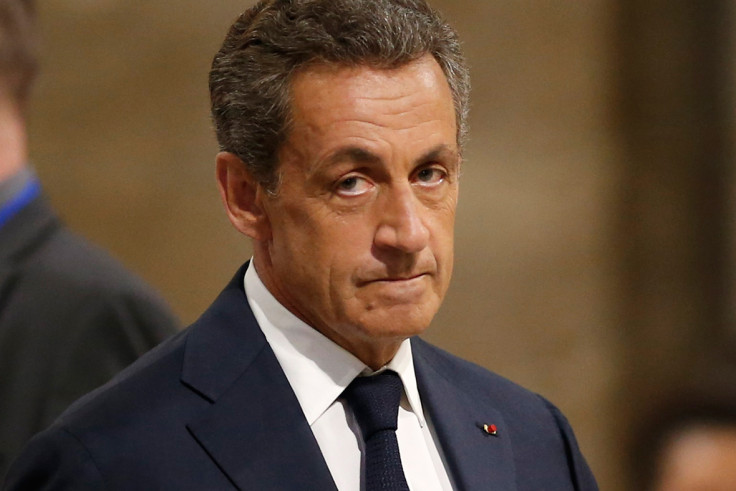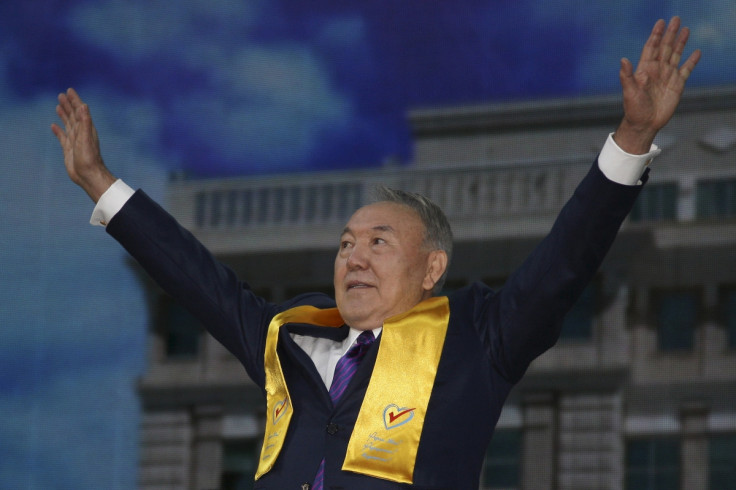Belgian authorities probe Kazakh paymasters in Nicolas Sarkozy's helicopter deal
Belgian Federal Parliament to examine events which "shame the country, democracy and justice".

A drama is being played out in the unlikely setting of a Brussels parliamentary committee room that could have made the plot of a John Le Carré novel, perhaps coupled with Game of Thrones.
A group of 17 Belgian parliamentary representatives are hearing how a deal to buy helicopters from France was hijacked in 2010 by a group of Central Asian businessmen being pursued by Belgian prosecutors for money laundering some 15 years earlier.
The 17 MPs form a cross-party committee of investigation under the auspices of the Belgian Federal Parliament to examine a series of events which shame the country, its democracy and its administration of justice.
At the core of the enquiry is the former French President Nicolas Sarkozy who, according to documents released from the French police investigation, agreed to a request from Kazakh President Nursultan Nazarbayev in 2010 to arrange for the businessmen's release from criminal charges in Belgium.
In return, Kazakhstan would spend US$2bn plus on French hardware, including 45 helicopters and trains. Sarkozy made it the centre piece of a boastful announcement in praise of French aviation at the Le Bourget air show in June of 2011.
The three businessmen in question, Alexander Mashkevitch, Alijan Ibragimov and Patokh Chodiev – the first two are Kyrgyz, the last Uzbek who are known as The Trio – have stood closer than anyone else at the side of the Kazakh autocrat when allegations of corruption knocked at his door over the last twenty five years.
Together, they hold much of the country's phenomenal mineral wealth on behalf of the president. This ranges from aluminium through to iron ore now held inside their secretive Luxembourg company Eurasian Resources Group. Deals they did in Africa are now being examined by the Serious Fraud Office in London.
Chodiev's and Ibragimov's Belgian nationality has already been the subject of the Belgian Parliamentary Commission investigation, as a police report linking him to Russian organised crime had mysteriously disappeared in 1997 from the file under consideration by Belgian administrators. The Commission was told that claims that the report had been forged could not be discounted.
A foreign power has interfered with a sovereign state.
Local parliamentarians examining Chodiev's application for Belgian citizenship say that information from the Belgian Secret Services failed to be passed on to the Parliament and the Justice Ministry.
Fast forward to 2011, and Belgian politicians and jurists were persuaded to change a law quickly, to enable the money laundering charges to be wiped away, the Brussels parliamentary hearing will be told in the coming weeks. The charges related to a murky deal involving the Trio and a Belgian electricity company called Tractebel, in the early 1990s. Today Belgian politicians are crying foul. "Our establishment has been shown to be compromised, even corrupt. A foreign power has interfered with a sovereign state," says George Gilkinet of the ecological party.
Belgium's political chaos would assist the Trio's release from the money laundering stigma. An amendment to a law allowing those being investigated for money laundering and grand corruption to secretly pay a fine to escape a court case was decided by the majority and had slipped through the Parliament in a matter of two months, between February and March 2011 at record speed and mistakes were made in the drafting of the law.
They moved very fast, they knew and used the right people to change a law and to have it enforced in record time.
But before the Parliament had time to correct the law, the Trio had used it to ensure they received a settlement – in Belgium it is called "transaction penale" – and the money laundering charges were cleared on payment of a €22.19m fine in June 2011 in secret. The deal to sell the helicopters to Kazakhstan was signed a week later.
Gilkinet says: "They moved very fast, they knew and used the right people to change a law and to have it enforced in record time. The Commission is investigating how it could have been possible and who helped them to get all that they wanted."
French administrators and lawyers were instrumental in winning support and influence in high places in Belgium. The Kazakh-backed businessmen provided the funds to assist their efforts. So Chodiev was on hand with ready cash, some €20m of which €5m was in banknotes of €500.

French media have suggested this could have come from Eurocopter, the French company (now known as Airbus) selling the helicopters. Chodiev was particularly interested in the helicopter deal as he is said to own a helicopter repair company in Kazakhstan and expected to win the maintenance contract. Airbus did not respond to requests for comment.
One payment of €12m that leaked from the helicopter deal went to a leading Kazakh politician and others went to accounts in France and Belgium, French press have reported.
Some of the money from the helicopter deal, the Brussels Commission will be told, found its way into the bank account of the former President of the Belgian Senate, Armand De Decker, who had claimed to work as a lawyer for the Trio.
This Belgian insider was able to call on the Belgian Minister of Justice one Sunday morning to discuss the case. Services like this earned him a fee of €700,000 but it was paid without an invoice or any documentation. De Decker, who is being investigated by the Belgian justice department, is a former Minister and the mayor of the Brussels municipality of Uccle.
READ MORE: Former French president Nicolas Sarkozy to stand trial over campaign finance accusations
The identity of other Belgian recipients of the Kazakh cash can be surmised. De Decker was a leader of the Movement Reformateur, the French-speaking Liberal party, the largest component of the country's coalition at the time. Senior members of the MR party, are facing scrutiny.
Many still hold office in Belgium and this is why Dirk van der Maelen, the opposition socialist representative who chairs the parliamentary commission, says it has taken so long for Belgium to investigate the scandal. "Due to political pressure in our justice system, we only started to investigate this when we had to. The Liberal Party that controls the government has a lot of strong people in the justice system."
Yet Anticor, the anti-corruption NGO that is following these affairs closely, believes the effects of a successful investigation could be dramatic. "The fall of the Belgian government is not out the question' says a representative. 'This goes to the heart of the Prime Minister's team of advisers."
There are James Bond elements to the intrigue that could make the forthcoming hearings sensational. Cash was moved using a French secret services man who had seen service in French colonial Africa. It went to the lawyer's office in Nice and onwards to Brussels. This will intrigue the Commission. So too will a series of dirty tricks, including the reported theft over a weekend in November 2011 of a briefcase and laptop from the offices of a government lawyer engaged in drafting the financial settlement for the Trio.
A Zurich hotel room was the surreptitious scene for a handover of cash. Chodiev's lawyer, Catherine Degoul, had admitted, under interrogation in France, receiving a brief case from Chodiev containing €5m in €500 banknotes.
For many, the horse has long bolted, and the Commission has come too late to salvage Belgian pride.
She told investigators that at first the briefcase contained just €2m, but the lawyer protested that he was selling her short. He sent out for another €3 million to top it up. Degoul has been questioned by French police and is currently under investigation by two French investigating judges. Degoul was eventually paid €7m for her legal services.
Schemes hatched in dark corridors of the Elysees were masterminded by Claude Gueant, the President's former Minister of State dubbed "The Cardinal", together with des Rosaies, Chodiev and Degoul. Meetings with the former deputy head of Eurocopter were held by the swimming pool at Chodiev's villa at Saint-Jean Cap Ferrat in the Cote d'Azur.
It took the discovery of a suspiciously large payment of €300,000 in 2011 in the account of Jean-Francois Etienne des Rosaies – Gueant's right-hand man in the dossier – by French anti-economic crime agency Tracfin to bring these devious payments to light. French anti-money laundering police followed the money trail, which led to Degoul, to Chodiev and on to Belgium. In Spring 2012, two French judges began an investigation into the helicopter sale which uncovered much email evidence to show corruption. Des Rosaies was arrested in September 2014. Degoul has been arrested and is being treated by the French authorities as "under suspicion".
The worthy parliamentarians sitting in the Brussels committee room want to know where all this leads next. In the following weeks, as witnesses tell their stories to the Belgian Commission, they will know more. That is why some speculate the Kazakh curse has put the very integrity of their politicians and their government in jeopardy. For many, the horse has long bolted, and the Commission has come too late to salvage Belgian pride.
Nick Kochan is an investigative writer and journalist based in London. He is currently writing 'The New Khans', an investigation of financial abuse and corruption inside Central Asia's ruling elites.
© Copyright IBTimes 2025. All rights reserved.





















